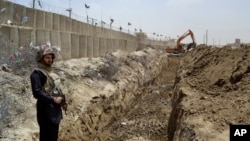The Pakistan-Afghanistan border must be secured to keep terrorists from crossing "at free will," Pakistan's ambassador to the U.S. says.
Aizaz Ahmad Chaudhry told VOA Urdu in an interview that the Afghan government's change in priorities — focusing on protecting urban areas — has given the Taliban and other extremist groups room to roam freely in a growing patchwork in the rest of the country.
"Pakistan has been cautioning for a long time that the ungoverned spaces in Afghanistan will act as a magnet for the militants of the world," Chaudhry said. "I think the situation in Afghanistan is deteriorating."
He repeated Pakistan's claims that it is not harboring any terror groups despite President Donald Trump's insistence, as part of his new strategy for the region, that Islamabad must do more to crack down on extremists.
"In Pakistan itself, there is no organized presence of ISIS," Chaudhry said, criticizing Afghanistan's claims that Islamic State fighters are filtering in from Pakistan. "Don't create distractions by saying they come from Pakistan. We can never tolerate the presence of Daesh [ISIS] in Pakistan."
Pakistan says recent military operations have chased terrorists from the country.
"In the last three years, we have done a lot, not for the sake of any other country, but for our own people," Chaudhry said. "We have defeated the forces of terrorism. The terrorists are on the run. There is no safe haven in Pakistan. The safe havens have moved into Afghanistan. That is where the focus of action should be."
He called for closer cooperation between the two countries' intelligence agencies and militaries.
"One major area to work on is border management," Chaudhry said. "We both must make sure the terrorists cannot cross the border at free will. Let's secure that border."
Pakistan has been building a border wall and has repeatedly closed the main border crossings, shutting down trade between the two countries for extended periods.
Chaudhry also called for cooperation on dealing with Afghan refugees and reconstruction, saying there is no military solution possible for the ongoing conflict there.












